More speed camera trouble: FOX 5 I-Team investigation finds another 6K erroneous tickets
FOX 5 I-Team finds more speed camera trouble
Thousands of ticketed drivers may be getting their money back, after an investigation by the FOX 5 I-Team found tickets generated by automated school zone cameras in Riverdale used the wrong speed limit.
RIVERDALE, Ga. - If you drive in Riverdale and have received a school zone speeding ticket, check your ticket again.
In a continuing investigation into automated traffic cameras, the FOX 5 I-Team has discovered thousands more citations slapped on drivers based on the wrong speed limit.
The revelations have Riverdale Police Chief Todd Spivey questioning if using machines to ticket drivers is worth the headache.
"Initially, this was presented as a good idea, as a good way to slow the people down and create safer school zones," Spivey said. "But if we’re going to engage in constant problems and losing the trust of the public because of the issuing of civil-penalty citations, do we need to revisit the idea of, is it really working?"
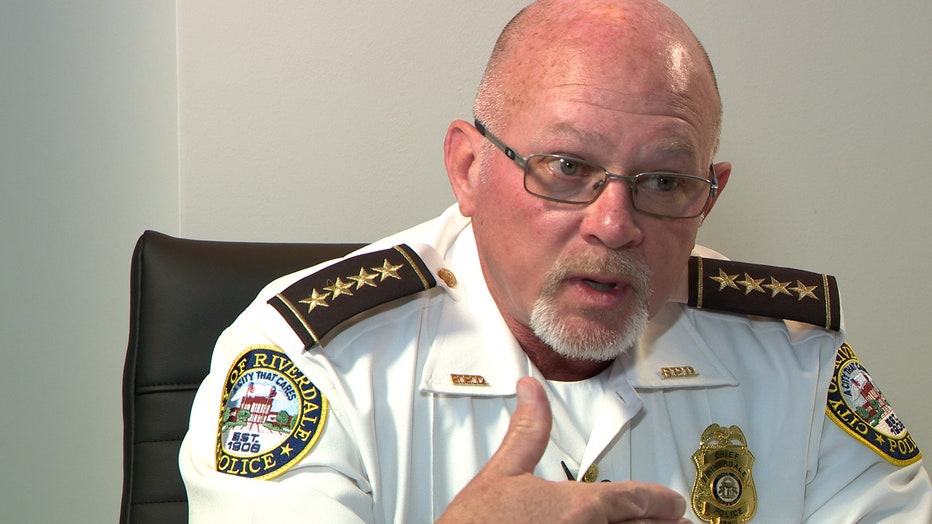
Riverdale Police Chief Todd Spivey said he and his staff are going through the FOX 5 I-Team's research, and anyone who received an erroneous speeding ticket will be reimbursed. (FOX 5)
Last year, the I-Team revealed how the Jonesboro Police Department issued hundreds of bogus tickets, with the city announcing refunds totaling $76,400.
Outside two schools in that city, speed limit signs said one thing, while traffic enforcement cameras operated by their own set of rules.
The I-Team has discovered the same problem in neighboring Riverdale but on a larger scale.
An analysis of ticket data found 6,350 violations mailed to drivers who shouldn't have been cited at all. It’s all due to six cameras on three roads, which clock drivers passing Riverdale High and Riverdale Middle schools.
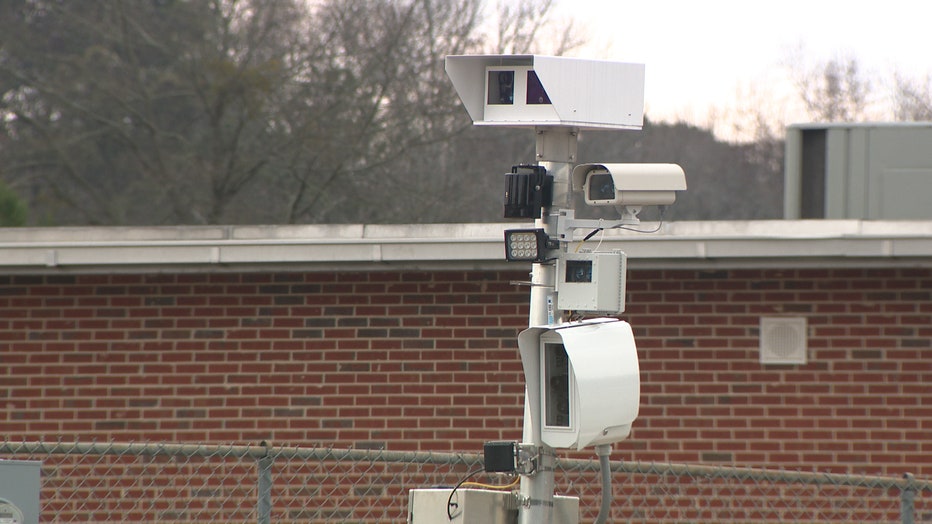
An automated school zone camera system, managed by RedSpeed, stands guard near Riverdale Middle School. The FOX 5 I-Team found the cameras have been citing thousands of drivers based on the wrong speed limit. (FOX 5)
In the school zone, signs with orange lights announce that the speed limit is 25 miles per hour "when flashing." Then drivers pass cameras whose internal timers are apparently out of sync – tagging drivers based on that 25 mph speed limit before and after the lights activate.
To get a ticket from a camera, by law, a vehicle must go at least 11 miles over the speed limit. But drivers got tickets as if the lights were flashing when they clearly were not, and the speed limit should have been 35.
"It is sending a bad message," Spivey said. "If it’s not accurate, then it’s misinforming them."
Many drivers received multiple erroneous tickets that way. The discrepancy has affected an estimated 5,600 motorists, with more than $500,000 levied in potentially invalid fines. The data analyzed by the I-Team dates back to May 2022 and ends in early January, so there could be more questionable tickets.
First violations in Riverdale cost $80, and all subsequent tickets cost $130. Riverdale contracts with the same camera company that manages Jonesboro’s cameras – RedSpeed, which gets a 35 percent cut of every violation paid.
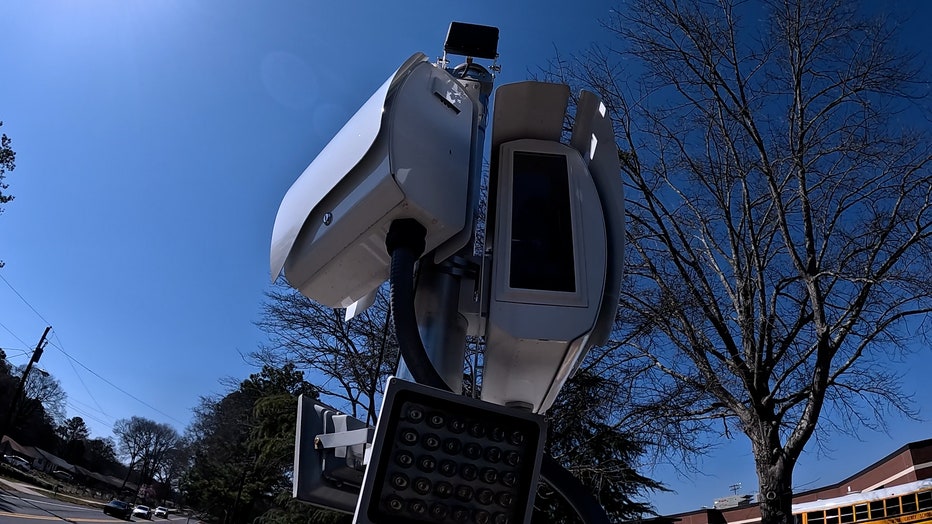
These cameras clock drivers passing by Riverdale High School and, like others in the area, have been generating speeding citations based on the wrong speed limit, a FOX 5 I-Team investigation found. (FOX 5)
The company said through a spokesman that it won't comment until after a RedSpeed agent meets with the city next week.
Touted as a school safety measure, automated school zone speed cameras were legalized by the state legislature in 2018, with a bill passed after midnight before that year’s Sine Die, reportedly with help from then-Speaker of the House David Ralston, whose son was lobbying for a speed camera company.
In this year’s legislative session, lawmakers who have been hearing complaints about ticket-happy cameras pushed bills that would have restricted when the systems can ticket or overturned the 2018 law completely, forcing police departments to shut their cameras down. Neither measure passed.
Riverdale resident Ann Owens warned her city about its camera problem early last year, speaking before the city council in February 2023. Owens reported that she received multiple tickets on Lamar Hutcheson Parkway for going just over 35 – after 9 a.m. when the flashing lights were off.
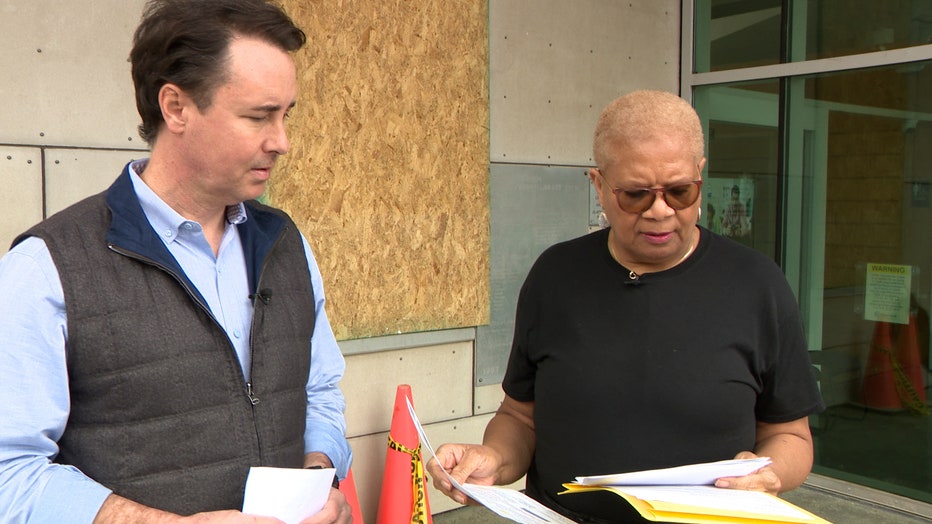
Riverdale resident Ann Owens shows the I-Team the five tickets she received for speeding above 25 on Lamar Hutcheson Parkway during times when the school zone flashers weren't blinking. (FOX 5)
"I got another one in the mail," Owens told FOX 5. "Then another and another and another. Until I got five more in the mail. And each time I came through the zone, the light was not flashing, I’m doing 36, 38, and I couldn’t understand why I was getting tickets. These tickets are $130 apiece."
Owens said her main complaint was that no signs told drivers that the cameras operated throughout the school day.
"I don’t have a problem with the camera enforcing the speed zone for the kids," she said. "I mean, who wants to hit a kid? Nobody."
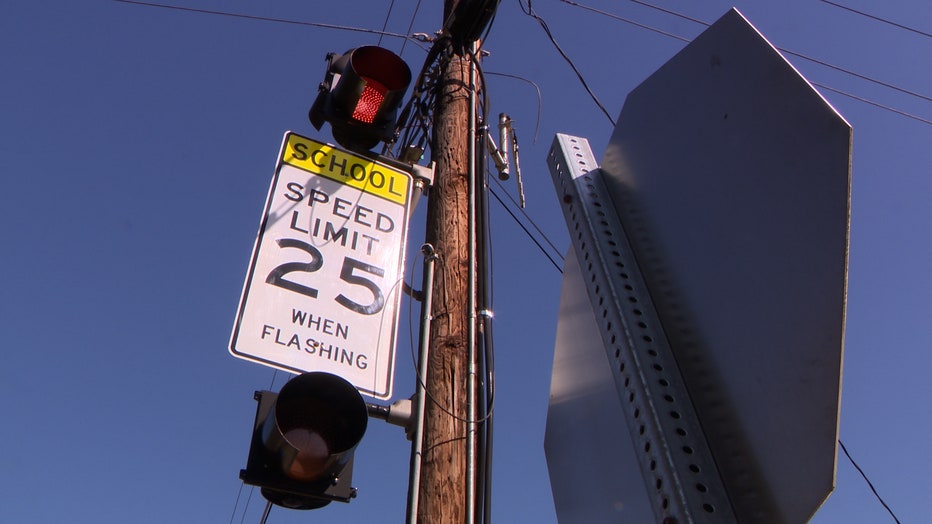
An analysis by the FOX 5 I-Team found thousands of speed camera citations issued in Riverdale were out of sync with school zone flashers like this one, which tell drivers when the speed limit dips to 25. (FOX 5)
Spivey dismissed her tickets, but he didn’t launch a systematic review. He said he did reach out to RedSpeed and did so again after FOX 5 reported on the problem in Jonesboro.
"I told my folks, ‘Get in touch with RedSpeed and make sure all this equipment is synced up,’" Spivey said. "And the feedback I got was, it’s synced."
Under the system, a Riverdale police officer must sign off on all citations before they’re mailed to car owners. The chief said "human error" may be involved on the part of his department too.
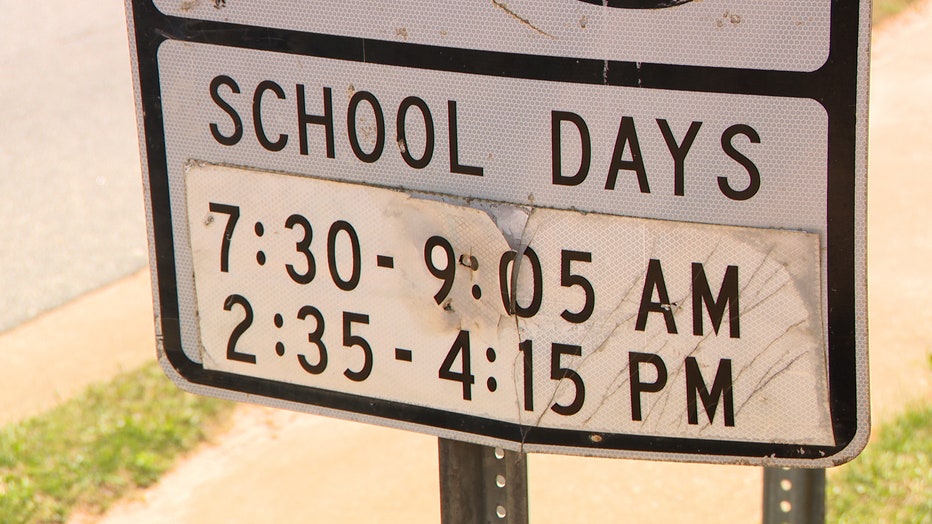
Riverdale Police Chief Todd Spivey said automated speed cameras set up near Riverdale High and Riverdale Middle schools may be programmed based on this schedule printed on some street signs rather than the times when the orange flashers actually flas
Spivey said the problem may be that the cameras are programmed according to a schedule of 25 mph speed limits printed on three street signs in the area, and those times don't line up with times that the flashers actually flash, which is set by the county's transportation department.
School zone flashers typically go off in the morning and afternoon to slow traffic both when children head into school and leave for the day. The automated cameras can ticket throughout the school day, though, based on the fluctuating speed limit.
The 25 mph times on the signs cited by Spivey: 7:30 to 9:05 a.m. and 2:35 to 4:15 p.m. Only one of those three signs is posted before a speed camera. The I-Team ran another analysis on Riverdale’s ticket data using this schedule of times, and that analysis still found 1,265 citations issued based on the wrong speed limit.
So when do the lights actually blink? The I-Team checked with Clayton County Transportation and Development and checked the flashers themselves.
Actual times: 7:35 to 9 a.m. and 2:40 to 4:30 p.m.
The chief even saw for himself, accompanying the I-Team to watch one of the flashers on Lamar Hutcheson Parkway. The cutoff time observed: 9 a.m.
"Immediately, as soon as we walk away from here, I'm going to instruct the lieutenant not to validate any citations between 9 and 9:05," the chief said.
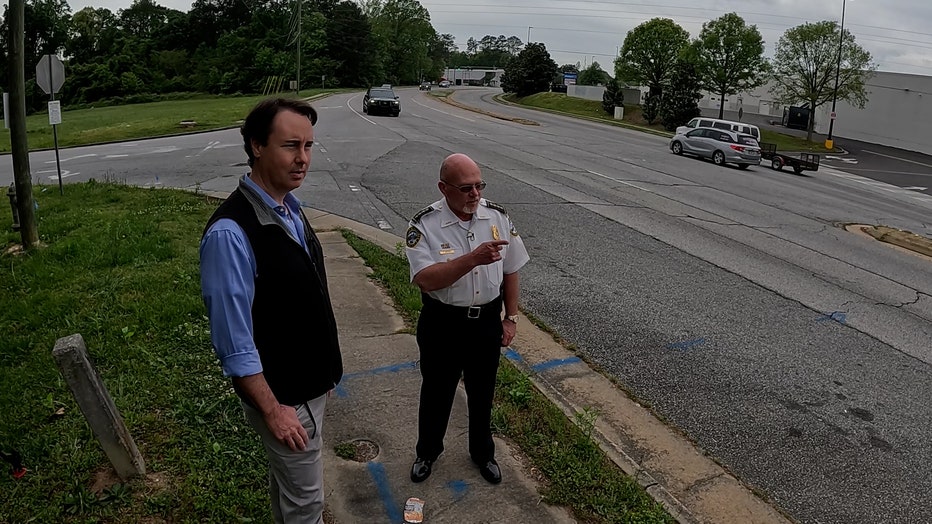
Riverdale Police Chief Todd Spivey met with the I-Team to see when one of the flashers on Lamar Hutcheson Parkway actually stops blinking in the morning. The stop time: 9 a.m. (FOX 5)
One legal expert said it’s the street signs that matter – not some schedule maintained by a municipality or printed on hard-to-locate signs.
"It’s how it’s communicated to the public," said Kim Keheley Frye, who once worked as a traffic prosecutor for the Cobb County Solicitor General’s office. "Although you’re presumed to know what the law is, you can’t know what a changing speed limit is unless someone notifies you of that."
Frye said any tickets issued for a speed limit other than the one posted immediately before the cameras aren’t valid.
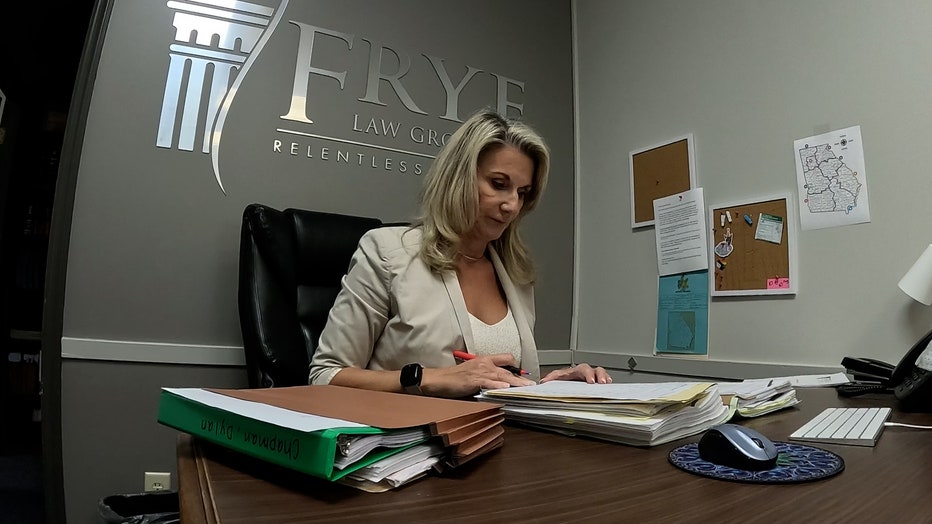
Marietta attorney Kim Keheley Frye said tickets citing drivers for a speed limit other than the one on street signs immediately before the automated cameras aren't valid tickets. (FOX 5)
"They should refund the money," she said.
Spivey, whose staff is still going over the I-Team’s analysis, said he agrees that anyone who paid for an erroneous ticket should get their money back.
"We just want the system to work to keep the kids safe, to slow people down," the chief said. "But if there’s problems with it, we need to fix it."

